
New research found that the modern experience of coming out for LGBTQ2+ individuals is marked by deep ambivalence, driven by both increased visibility and contrasting societal resistance. This complex experience is influenced by generational differences, societal events like Pride celebrations, and the need for institutional support and diverse cultural representation.
In a time of unparalleled visibility for the LGBTQ2+ community, contrasted with significant resistance, revealing one’s sexual identity can be a profoundly mixed experience, according to new research.
A study in Theory and Society, led by sociologists Dr. Amin Ghaziani and Andy Holmes, delved into the personal accounts of 52 adults from Vancouver, discussing their coming-out experiences from the past five years.
We spoke to Dr. Ghaziani (he/him), professor in the UBC department of sociology and Canada Research Chair in Urban Sexualities, about the findings.
Why were you interested in recent experiences of coming out?
Coming out is about sharing your identity with someone, and it’s an ongoing process that happens at different times with different people.
In the 1980s and 1990s, coming out was a transformative act, although still very much a struggle, in a homophobic society. In the 2000s and 2010s, the narrative changed from what we might call “struggle and success” to “emancipation” as people in the West generally found more acceptance in society. Coming out became less formal and less fraught.
Today, LGBTQ2+ people have more visibility than ever before, with more than four percent of Canada’s population identifying as LGBTQ2+ and 7.2 percent for American adults in a 2022 Gallup poll, double what it was when Gallup first measured sexuality a decade ago.
Despite political progress on both sides of the border, there’s been a lot of troubling backlash. In Vancouver, violent anti-trans hate crimes have been on the rise for a few years. And in the U.S., state legislatures introduced 525 anti-LGBTQ2+ bills just this year.
We live in a curious moment today of unprecedented progress and brutal backlash. How do these crisscrossing currents affect coming out? That’s what we wanted to figure out.
What did you find?
In short, it’s complicated. Neither a narrative of struggle and success nor emancipation fully captures what it’s like to come out today. Instead, we found that people are deeply ambivalent.
One reason for this ambivalence is an awareness among young people today of significant generational differences. For example, Hugh, a Chinese gay man we spoke to, saw firsthand how attitudes differ between Gen Z, for whom coming out is often met with easy acceptance, and older colleagues at work who were thrown out of their homes when they came out. For Hugh, a millennial, coming out was somewhere in between. It was “awful,” he said, and it took years to plan, but when it happened, “it just happened,” and didn’t feel triumphant.
Pride celebrations can make things more confusing. Another respondent, Silky, describes why it’s hard to come out this time of year. “I don’t feel like I belong because I’m dating a man,” she told us. Although Silky lives in Davie Village, where “Pride is literally happening all around my house,” she hears “gay people in the crowd” who say things like, “I hate all these straight couples at Pride.”
Hearing this makes Silky, who identifies as bi, feel like an outsider. As she says, “I feel a little bit more like I belong when I’m not physically with my partner, which is really sad. I shouldn’t have to walk around Pride wearing this big shirt that says, ‘I’m bi.’”
What can be done to support individuals wanting to come out today?
Most people live in a grey area in between the extremes of a liberal, accepting society and one wracked by relentless bigotry and discrimination. That affects how we think about our sexuality: it distinguishes us, but it doesn’t necessarily define us, at least not all the time.
When it comes to practical steps, institutions still play a big role in the after-effects of coming out goes. Having policies that protect against discrimination based on sexual orientation and gender identity is crucial for creating supportive environments. But when it comes to matters of culture, like what we see on the silver screen, we need more diversity of voices so people can understand and appreciate that there are many ways of coming out and identifying as LGBTQ2+.
Reference: “Distinguishing but not defining: How ambivalence affects contemporary identity disclosures” by Amin Ghaziani, and Andy Holmes, 26 July 2023, Theory and Society.
DOI: 10.1007/s11186-023-09521-8









Seriously? Take a minute, and think about if this should be here, science and technology…maybe better instead in Cosmo, or just someone’s diary?
“University of British Columbia Department of Sociology and Canada Research Chair in Urban Sexualities”, really? You’re…what? Are you genuinely the Research Leader of Sex in the City?
Should SciTechDaily continue publishing Canadian ‘research’?
Leave it to homophobes to be triggered by research on homosexuality, they just can’t help themselves. I’d say we need more research on peculiar creatures such as yourself, see just why this makes you tick so much.
Triggered? No. Fear? No. “We found that people are deeply ambivalent.”, nearly, but instead of the conflicted state of ambivalence, phrases like “Neither a narrative of struggle and success nor emancipation” and “didn’t feel triumphant” show they’re actually describing indifference, which also describes my reply.
This definitely does not belong in SciTechDaily. I thought SciTechDaily was about science and technology not perversity and political agenda. The LBGTQ+ stuff is very out of control give that all of these freaks are completely unnatural, unscientific, and arguably insane. I say unnatural because sexuality exists for procreation and and continuing the human race not for hedonistic fun. If everyone was some sort of LBGTQ+ freak the human race would cease to exist because procreation is impossible in two men, two women, or some trans it. Now for some science.
Every human cell with a nucleus has 46 chromosomes two of these determine the sex of the individual. All men have one X chromosome and one Y chromosome, and all women have two X chromosomes. This is a scientifically proven fact of life. Wether an individual will be a man (XY) or a woman (XX) is determined at the conception of the individual, when two heterosexual individuals procreate to naturally continue the human race. This is also a scientifically proven fact of life.
Any individual who believes they are the opposite gender is arguably insane because they believe they are something they are not, this sounds like a delusion to me.
It’s actually very natural. The animal kingdom has plenty of examples if you look into homosexual behavior in animals, as with mallard ducks it can be up to 19% of pairs. There are even intersex people born with chromosomes as XYY, or XXYY, or XXX, etc.. Sorry to say, but Alfred Kinsey even found in the 1940s that only a minority fraction of people are a 0 on the Kinsey Scale, or “completely straight”.
You’re right it isn’t procreating. Many societies definitely frowned on it perceiving it as non-productive. Procreation doesn’t have to be the sole basis for tolerance. That’s a much wider discussion than the topic of the article.
My problem is that this article is a survey of how 52 Vancouverites are feeling, emotionally and politically, with anecdotes. That’s miles away from science (and technology), so far off that you’re right. I come to scitechdaily for hard news, for “the best intelligent, informed science and technology coverage and analysis”, trying to escape the nonsense political agendas of the culture wars which overtook other news sources.